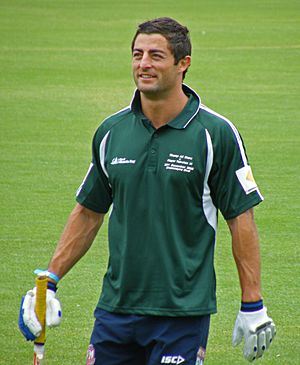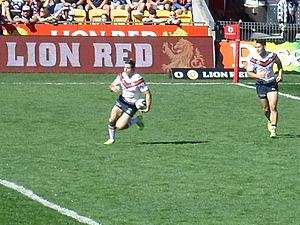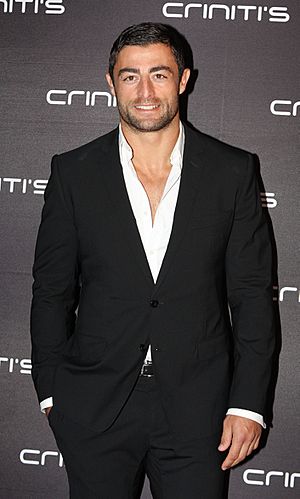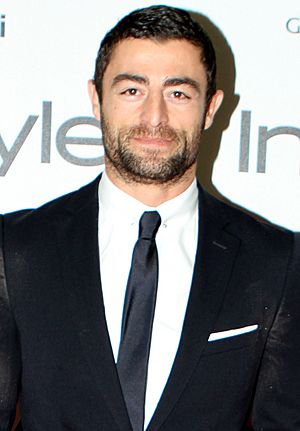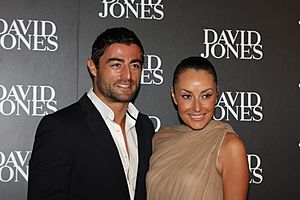Anthony Minichiello facts for kids
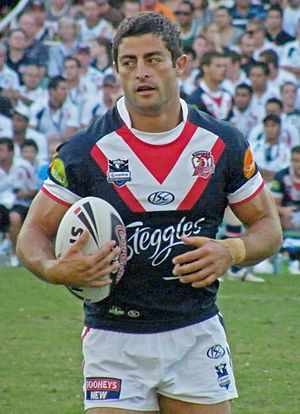 |
||||||||||||||||||||||||||||||||||||||||||||||||||||||||||||||||
|
Personal information
|
||||||||||||||||||||||||||||||||||||||||||||||||||||||||||||||||
|---|---|---|---|---|---|---|---|---|---|---|---|---|---|---|---|---|---|---|---|---|---|---|---|---|---|---|---|---|---|---|---|---|---|---|---|---|---|---|---|---|---|---|---|---|---|---|---|---|---|---|---|---|---|---|---|---|---|---|---|---|---|---|---|---|
| Full name | Antonio Marcus Minichiello | |||||||||||||||||||||||||||||||||||||||||||||||||||||||||||||||
| Born | 24 May 1980 Liverpool, New South Wales, Australia |
|||||||||||||||||||||||||||||||||||||||||||||||||||||||||||||||
|
Playing information
|
||||||||||||||||||||||||||||||||||||||||||||||||||||||||||||||||
| Height | 182 cm (6 ft 0 in) | |||||||||||||||||||||||||||||||||||||||||||||||||||||||||||||||
| Weight | 91 kg (14 st 5 lb) | |||||||||||||||||||||||||||||||||||||||||||||||||||||||||||||||
| Position | Fullback, Wing | |||||||||||||||||||||||||||||||||||||||||||||||||||||||||||||||
|
||||||||||||||||||||||||||||||||||||||||||||||||||||||||||||||||
| Relatives | Mark Minichiello (brother) | |||||||||||||||||||||||||||||||||||||||||||||||||||||||||||||||
Anthony Minichiello, born on May 24, 1980, is a famous former professional rugby league player. He was the captain of the Sydney Roosters team in the National Rugby League (NRL). He holds records for playing the most games and scoring the most tries for the club.
Minichiello played for the Australian and Italian international teams. He also represented New South Wales in the State of Origin series. He spent his entire career with the Roosters. With them, he won the NRL Premierships in 2002 and 2013. He retired after the 2014 season. In 2005, Minichiello won the Golden Boot Award as the best international player. His brother, Mark Minichiello, also played rugby league for Italy.
Contents
Early Life and Start in Rugby League
Anthony Minichiello grew up in Liverpool, a part of South Western Sydney, Australia. His family had Italian heritage and lived on a five-acre property. They grew their own vegetables and raised chickens.
When he was younger, Anthony was very active in sports. From age six to eleven, he was a gymnast and competed at the state level. He also competed in long-distance running at the state level.
Minichiello started playing rugby league for a team called East Valley United. A famous rugby league player, Arthur Beetson, noticed him when he was young. Beetson, who worked for the Roosters, signed him to the club. In 1999, Minichiello played for Italy in the first-ever Mediterranean Cup. He announced his retirement from the sport on August 4, 2014.
Professional Playing Career
Starting Out in the NRL
The Sydney Roosters signed Minichiello when he was 16 years old. This happened after a trial game where he played as a right centre. His father wanted him to finish school or learn a trade if he wanted to play football. Anthony chose to become a cabinet-maker, balancing his apprenticeship with his football training.
Minichiello made his NRL debut at age 20 on February 25, 2000. He played for the Roosters against the Canterbury Bulldogs at the Sydney Football Stadium. He was the 994th player to play first-grade rugby league for the Roosters. In his first year, his team lost to the Brisbane Broncos in the 2000 NRL Grand Final. By his second season, he was good enough to play representative football. He was chosen for the City Origin team in the 2001 City vs Country Origin match.
Becoming a Star Player
In the 2002 NRL season, Minichiello scored 16 tries. He played on the wing when the Roosters won the 2002 NRL Grand Final against the New Zealand Warriors. He was also part of the Roosters team that won the 2003 World Club Challenge. They beat the English champions, St. Helens, 38–0 in England.
After the 2002 season, the Roosters coach, Ricky Stuart, moved Minichiello to play as a fullback. This change helped the Roosters play some of their best football. It also led to Minichiello being chosen for the New South Wales and Australian teams. He played his 100th NRL game for the Roosters in the 2003 NRL Finals Series. He was named Man of the Match in the Roosters' win over the Bulldogs. The Roosters then lost the 2003 NRL Grand Final to the Penrith Panthers. In 2003, Minichiello ran with the ball for 4,571 metres, more than any other player. After that, he went on the 2003 Kangaroo tour with Australia. Australia won The Ashes by beating Great Britain 3–0.
In 2004, Minichiello was chosen for New South Wales again. He was briefly removed from the team for breaking a rule, but he returned. He helped New South Wales win their second series. He was named the Dally M Fullback of the Year in the 2004 NRL season. He scored a career-high 18 tries that season. He also won the Harry Sunderland Medal as the players' player of the year. Minichiello played fullback for the Roosters in their 2004 NRL Grand Final loss to the Bulldogs.
Minichiello was selected for the Australian team to play in the 2004 Rugby League Tri-Nations tournament. In the final against Great Britain, he played fullback and scored two tries. Australia won 44–4. He had another great season in 2005. His performances for New South Wales earned him the Wally Lewis Medal for the best player in the 2005 State of Origin series. He also won the Harry Sunderland Medal again for the 2005 Rugby League Tri-Nations tournament. This was despite New Zealand beating Australia 24–0 in the final. This game was Minichiello's 18th and final test match for Australia. He also won the 2005 Golden Boot Award as the international player of the year.
Battling Injuries
Minichiello had a long period without injuries, but this ended in 2006. A back injury, which needed surgery, kept him out for the rest of the season. This injury also happened when the Roosters' performance declined.
Between 2006 and 2009, Minichiello faced several serious injuries. In 2006, he had back surgery. In 2007, he needed a second back operation. In 2008, he had a neck injury that was very close to his spinal cord. These injuries led him to try new training methods and a special diet. He believes these changes helped him manage his injuries and continue his career.
In 2007, Minichiello was named as the fullback in the Roosters' "Team 100 – The Centurions." He kicked his first field goal in his career in a game against the Cronulla-Sutherland Sharks. Minichiello was called back to play fullback for New South Wales in Game 1 of the 2007 State of Origin series. He played well, but his back injury forced him out of the next two games. He was replaced by Brett Stewart. His back injury kept him off the field for the rest of the 2007 season.
In the 2008 NRL season, Minichiello returned but his back pain came back. This affected his chances of playing for Australia again. In 2009, he played only two games before injuring his ankle. He was out until Round 20. By then, the Roosters were struggling and finished last in the NRL.
Later Career and Retirement
In the 2010 NRL season, Minichiello was healthy again for the first time since 2005. He moved from fullback to the wing to make space for a new player, Todd Carney. He played well in this position and was chosen for the 2010 City v Country Origin match. Minichiello signed a new one-year deal with the Roosters. On August 23, 2010, he scored his 100th try against the Gold Coast Titans.
Minichiello recovered from a hamstring injury to play in the 2010 NRL finals series. The Roosters reached the Grand Final but lost to the St George Illawarra Dragons 32–8. During the 2010 season, Minichiello moved back to fullback. Todd Carney went on to win the Dally M Medal as the NRL Player of the Year.
In 2011, Minichiello was named to the Italian team for the 2013 World Cup qualifying. He was called up for Game 2 of the 2011 State of Origin series for New South Wales. He scored the winning try for New South Wales, helping them win 18–8. In Round 16 of the NRL season, he scored his 105th try against the Newcastle Knights. This made him the all-time leading try-scorer for the Roosters, breaking the record of 104 held by Bill Mullins.
At the end of the 2011 NRL season, Minichiello captained Italy to a draw with Lebanon. This result was enough for Italy to qualify for the 2013 World Cup. In May 2012, Minichiello signed a new one-year deal with the Roosters.
Minichiello captained the Roosters in 2013 and led them to victory in the 2013 NRL Grand Final. He was the first fullback to captain his team to a grand final win since Frank 'Skinny' McMillan in 1934. At the end of the 2013 NRL season, Minichiello captained Italy in the 2013 World Cup. Italy did not advance past the group stage.
On August 4, 2014, Minichiello announced his official retirement from the game. He played his entire career with one club, the Roosters. In his final game, Minichiello broke Luke Ricketson's record for most matches with the Roosters. He captained the team in his 302nd game, scoring two tries. The Roosters lost that game to the Rabbitohs. His record was later broken by Mitchell Aubusson in 2020.
Awards and Achievements
|
Individual Awards
|
Team Achievements
|
Career Statistics
Personal Life and Nicknames
Anthony Minichiello is the older brother of Mark Minichiello, who also played rugby league. Both brothers have Italian family roots.
Minichiello had a few nicknames during his career. In 2001, his coach, Brett Kenny, called him "The Count" after the character from Sesame Street. He was also known as "The Italian Mountain Cat" or "MinCat" because of his quick and agile movements. Many people also simply called him "Mini."
On January 22, 2012, Anthony Minichiello married Australian shoe designer Terry Biviano. Their wedding was held at St Mary's Cathedral in Sydney. Terry Biviano was featured in the first season of WAG Nation, a reality show about the wives and girlfriends of Australian sportsmen.
On December 2, 2013, Anthony and Terry welcomed their first child, a daughter named Azura Trésor.
After retiring from rugby league, Minichiello started his own business called Mini Fit. He had registered the business in 2010. Mini Fit offers physical education programs and holiday clinics, mainly for schools. The programs often involve a qualified PE teacher working with an athlete, including young Roosters players. Mini Fit has also expanded to offer programs in schools for children with special needs.
 | Toni Morrison |
 | Barack Obama |
 | Martin Luther King Jr. |
 | Ralph Bunche |


